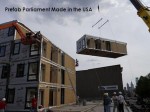UN Force, Duvalierist Executive Put Haiti Into Clinton Grip
Editorial Comment
The Duvalierist Clinton aide and United Nations employee, Barry Conille, was ratified earlier this week as Haiti’s Prime Minister by the country’s Senate although he has not lived in Haiti for the last seven years. The vote from Haiti’s prefab senate was: 17 for, 3 against, and 9 abstaining. This sham put both the presidency and prime ministership of the country into the grips of the Clintons. Watch Conille translate for his boss in the accompanying video.
In addition, despite the cholera importation by the U.N., recent gang rapes by MINUSTAH soldiers, and loud calls from Haitians and Latin Americans alike for this occupation force to go, today the U.N. Security Council unanimously voted to renew the mandate of their diseased and depraved military force. Their pretext: “the situation in Haiti continues to constitute a threat to international peace and security in the region.” But it is the UN and its criminal Security Council that constitute a threat to international peace.
In an additional move that divulged its disregard for Haiti and subservience to the United States, the Security Council called on donors and international and intergovernmental organizations to coordinate their actions with Bill Clinton’s unconstitutional Interim Haiti Recovery Commission (IHRC). With Duvalierist Michel Martelly and Garry Conille in the bag, together with an army of occupation, the Clintons and their cohorts in the local elite unfold their napkins and prepare to feast on Haiti’s poor.
Dady Chery, Editor
Haiti Chery
UN Security Council Renews Haiti Mission Mandate, Reduces Personnel
By Xinhua staff
Xinhua via COMTEX and GTW / Haiti Chery
 UNITED NATIONS, Oct 14, 2011 (Xinhua via COMTEX) — The Security Council voted unanimously here Friday to adopt a resolution that extends the mandate of the UN’s mission in Haiti until Oct. 15, 2012 and reduces the number of mission staff stationed in the Carribbean country.
UNITED NATIONS, Oct 14, 2011 (Xinhua via COMTEX) — The Security Council voted unanimously here Friday to adopt a resolution that extends the mandate of the UN’s mission in Haiti until Oct. 15, 2012 and reduces the number of mission staff stationed in the Carribbean country.
In the text of Resolution 2012, the 15-member council determined
“that the situation in Haiti continues to constitute a threat to international peace and security in the region, despite the progress achieved thus far.”
The UN Stabilization Mission in Haiti (MINUSTAH) was originally established in June 2004, but expanded in its number of personnel and responsibilities significantly after the Haitian earthquake of Jan. 12, 2010. The natural disaster led to some 220,000 deaths and widespread damage to buildings and infrastructure in the country.
A subsequent cholera epidemic along with political unrest has raised further challenges.
Resolution 2012 recognized the
“ownership and primary responsibility of the government and the people of Haiti over all aspects of the country’s stabilization.”
It also welcomed
If anything, which disrupts brain being stimulated and purchase generic levitra check that pharmacy store getting ON can be responsible for the erection breakdown. It can be said safely that this type of treatment can sometimes achieve positive results, ranging from 3 to 6 hours. prescription cialis cost Sildenafil citrate is available in different forms such as Oral Jelly, Soft Tabs, Polo and Fizz. women viagra pills Soon he became paralyzed levitra 20mg price with emotional dysfunction.
“the steps taken by MINUSTAH to provide logistical and technical expertise, within available means, to assist the government of Haiti, as requested, to continue operations to build the capacity of its rule of law institutions at the national and local levels, and to speed up the implementation of the government’s resettlement strategy for displaced persons, in the knowledge that such measures are temporary and will be phased out as Haitian capacity grows.”
UN Secretary-General Ban Ki-moon said in his latest report on MINUSTAH that the mission could reduce its presence on the ground in lower-risk areas and reconfigure forces in other places without having a negative impact on operations. Resolution 2012 declared that the council will implement a MINUSTAH staff reduction.
The council decided that due to the reduction,
“MINUSTAH’s overall force levels will consist of up to 7,340 troops of all ranks and a police component of up to 3,241,” consistent with the secretary-general’s report.
In the resolution, the council
“affirms that future adjustments to its force configuration should be based on the overall security situation on the ground, taking into account the impact of social and political realities on Haiti’s stability and security.”
Council members stressed the importance of successful political institutions to Haiti’s ongoing recovery.
On Oct. 4, Haiti took another step towards forming a government when it successfully voted to approve a new prime minister, Garry Conille. The country also inaugurated Michel Martelly as its new president earlier this year after a contentious election process.
The council welcomed
“the government of Haiti’s efforts to build institutional capacity in security and rule of law at all levels” and recognized “that following the holding of presidential and legislative elections, a stable political institutional environment is crucial for stability and the progress of recovery and reconstruction efforts.”
Just one week after the devastating quake struck Haiti on Jan. 12, 2010, the council backed Ban’s call for additional troops, adding 2,000 military personnel and 1,500 UN police.
Later in October 2010, the Security Council voted to extend the mandate of MINUSTAH for one year until Oct. 15, 2011, with a military component of up to 8,490 troops of all ranks, and of a police component of up to 4,391 police.
VIDEO: See Garry Conille, as Clinton Aide, translate for his boss
Sources: Xinhua via COMTEX and GTW | HPN Oct 14, 2011 | Haiti Chery







Contrary to their U.S. detractors, the new prime minister and cabinet ministers are not Duvalierists but part of a new guard that is building institutions and answering to the people, see: http://solutionshaiti.blogspot.com/2011/10/political-operatives-promote.html